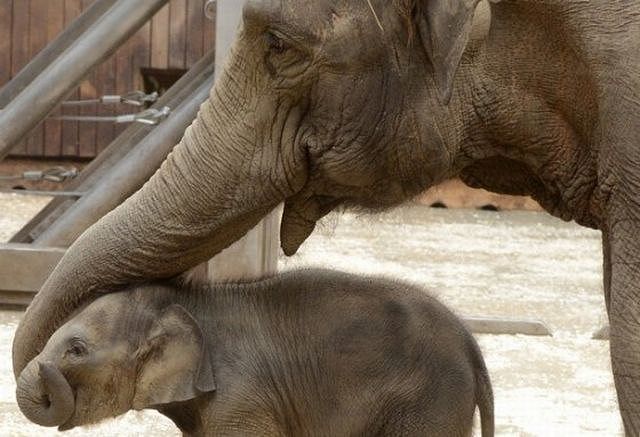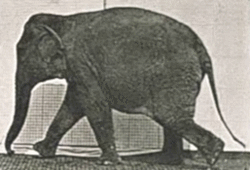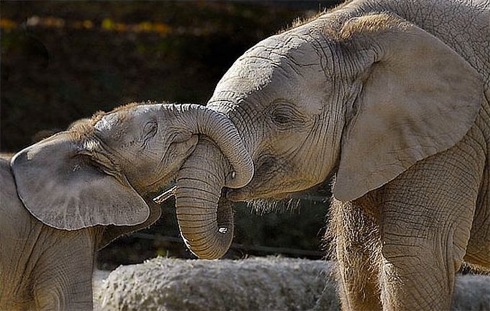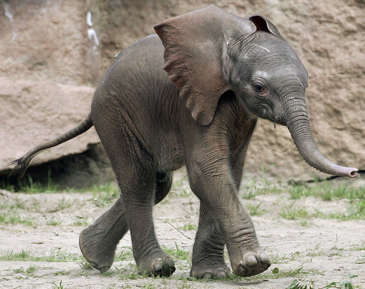THIS ELEPHANT IS HUGE,
HE PULLS OUT TREES
WITH HIS TRUNK.
Elephant
Did you hear the elephant sound
Herd of hoofs on the ground
Running, make your heart pound
In Africa they are found.


HOW DID THEY KNOW?
SOMETHING IN THE UNIVERSE IS MUCH
GREATER AND DEEPER THAN HUMAN
INTELLIGENCE.
THE ELEPHANTS' JOURNEY TO PAY RESPECT,
BUT HOW DID THEY KNOW?
|Lawrence Anthony, a legend in South Africa and author of 3 books, including the bestseller The Elephant Whisperer, bravely rescued wildlife and rehabilitated elephants all over the globe from human atrocities, including the courageous rescue of Baghdad Zoo animals during US invasion in 2003.
On March 7, 2012 Lawrence Anthony died.
He is remembered and missed by his wife, 2 sons, 2 grandsons and numerous elephants.
Two days after his passing, the wild elephants showed up at his home led by two large matriarchs.
Separate wild herds arrived in droves to say goodbye to their beloved man-friend.
A total of 31 elephants had patiently walked over 12 miles to get to his South African House.
Witnessing this spectacle, humans were obviously in awe not only because of the supreme intelligence and precise timing that these elephants sensed about Lawrence 's passing, but also because of the profound memory and emotion the beloved animals evoked in such an organized way: Walking slowly - for days - Making their way in a solemn one-by-one queue from their habitat to his house.
So, how after Anthony’s death, did the reserve’s elephants — grazing miles away in distant parts of the park — know?
“A good man died suddenly,” says Rabbi Leila Gal Berner, Ph.D., “and from miles and miles away, two herds of elephants,sensing that they had lost a beloved human friend, moved in a solemn, almost ‘funereal’ procession to
make a call on the bereaved family at the deceased man’s home.”
“If there ever were a time, when we can truly sense the wondrous ‘interconnectedness of all beings,’ it is when we reflect on the elephants of Thula Thula. A man’s heart’s stops, and hundreds of elephants’ hearts are grieving.
This man’s oh-so-abundantly loving heart offered healing to these elephants, and now, they came to pay loving homage to their friend.”
Lawrence's wife, Francoise, was especially touched, knowing that the elephants had not been to his house prior to that day for well over 3 years!
But yet they knew where they were going. The elephants obviously wanted to pay their deep respects, honouring their friend who'd saved their lives - so much respect, that they stayed for 2 days 2 nights without eating anything. Then one morning, they left, making their long journey back.

Elephant
Have you ridden on an elephant? When the children were young they had opportunity to ride on a small elephant, which of course is not really very small because they are animals that get to be very large. The male African Elephant can grow to be 13 feet high and weigh 15,000 pounds. His long trunk is like a fifth leg or arm used to pick things up and set them somewhere else. Or if he want to reach a branch at the top of a tree that is higher than he can reach with his trunk he will just wrap his trunk around the tree and pull it out of the ground and then he can get all he wants of the tree.
Elephants sometimes live to be 70 years old and they have very good memory. If a person is kind to the animal then the elephant will be kind in return. But be sure that this giant will also remember if a person is mean and forgetful of duty for then some have been known to pick up a person and bang him against something and stomp on him with his huge powerful feet.
They can be trained to be very good workers and have been used in wars in the past history. some trained elephants are even able to paint pictures by using the lip on the end of their trunk and hold the paintbrush. Just like any artist would do they make a picture on canvas.
Mommy and baby stick together with other mommies and babies and when the male baby gets old enough he leave the group of females and live by himself or with other grown male elephants.
These huge creatures get huge by eating grass and leave and fruits and vegetables, so you sure do not need meat to grow big.

A HUMANE ELEPHANT.
A HUNTING excursion in India, upon the backs of elephants, is rare sport; and the rajahs, or governors, sometimes invite their friends to make up a party, and take their spears and hunting-equipments for a chase after tigers and other wild animals.
The men in this picture are hunters. How gorgeously they are mounted! See the gay housings or saddlecloths of the elephants, with heavy, rich fringes falling over the head and sides of the animals! And what a fine seat the rajah has in his square " castle in the air"!
He could not expect any one to disobey orders from such a commanding position.
The driver sits upon the elephant's neck, with a sharp-pointed stick to spur up the animal, or guide him to the right or left.
This party have been coming down that ravine between the rocks upon a brisk trot;
when all at once the turbaned riders are brought to a "halt" without orders.
The leader in the chase, a noble elephant suddenly comes upon this group of sick
people in the grassy meadow, where they are lying in the sunshine and fresh air to recover from battle-wounds and fever.
Some have lame feet, and can just raise themselves upon their elbows; others stretch their hands imploringly above their heads; while some are too weak to help themselves at all. One mother looks up in terror, with her sick child clinging to her arm, so that she cannot even remove the jar of cool water, or stir from the spot.
The cruel rajah sees all these sufferers, and will make the whole party trample over them if he can. He orders the driver of the leading elephant to urge him forward, but on reaching the first sick man the sagacious animal will not advance another step.
In angry fury the rajah shouts, "Stick him in the ear!" The driver goads, and the riders shout, "Go ahead!" But all in vain: the elephant, more humane than his cruel master, will not trample upon the sick people; he turns his eyes first upon one
side, and then the other, as if to say, "Don't be afraid; I won't step on a single one of you." And the kind animal actually lifted them gently to the right and left as he passed along, thus clearing a path for the whole party to pass, without doing any harm to the frightened, helpless people. I hope this noble animal had his hurt ear nicely bathed; for an elephant's ear is very useful to him, not only to hear with, but as a fan to brush away insects, and a handkerchief to wipe his eyes. The rajah should have given orders for a nice bunch of the most luscious bananas for this elephant's dessert, and he deserved something more golden for observing the Golden Rule that his master had yet to learn. I do not wonder that ignorant people worship the elephant, if he is so much more merciful and intelligent than man. In Siam the rank and title of "king" is given to the white elephant; and be is called the "Pure King," "Wonderful King." His tusks are ornamented with gold rings, and gold chains are hung upon his head.
People in India and Siam are learning to worship the Creator, and not the creature; and they will "love mercy and deal justly" when they have learned the religion of Jesus.
Wall-Spring.

BABY ELEPHANTS.
A GENTLEMAN in Ragoon bought three young elephants and sent them to England. They are said to be very tame, cunning, and playful. They will not steal - paddy (unhusked rice) themselves, though they know where it is kept; but when the boys go to see them they will come up and coil their little trunks around a boy's arm and pull him along to the stable, and up to the paddy bag, and make a cat's paw of the boy's hand, until he takes up a handful of paddy.
Then he lets go of the arm, and turning up the end of his trunk, opens it like a cup and most coaxingly invites the boy to drop in the paddy. If the boy puts it back into the bag, he instantly seizes his arm again and makes him try once more, until he gets the paddy in his trunk; then he doubles his trunk under, opens his mouth, and blows the paddy out into it, and scampers off feeling as jolly as a boy does when he thinks he has done a cunning thing.
These are only little baby elephants from two to three years old, yet they allow the boys to ride on their backs, will lie down and get up at command, and perform quite a number of tricks.
It takes an elephant just about as long to grow as it does a man, that is, from eighteen to twenty years. They live, in this country, to about the same age as old men, that is, from eighty to one hundred years, though in the books you will read that they live to be two and three hundred years old. It may be so in Africa, but I doubt it.
Watchman